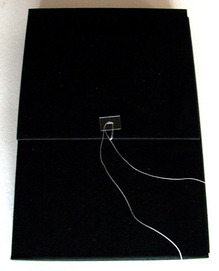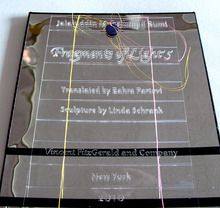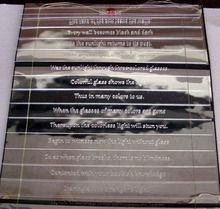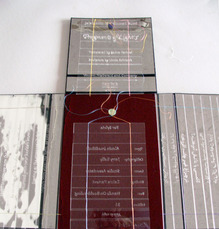The rays of the sun leave the walls.
Every wall becomes black and dark
As the sunlight returns to its post.
What stunned you at faces of beauty,
Was the sunlight through three-colored glasses.
Colorful glass shows the light
Thus in many colors to us.
When the glasses of many colors are gone
Thereupon the colorless light will stun you.
Begin to witness now the light without glass
So as when glass breaks, there is no blindness.
Contented with your bookish knowledge
Staring at the stranger’s light?
Watch Him steal the light, as you learn
You are a borrower, not a giver of light.

Maulana Jalāl al-Dīn Rūmī (1207-1273), Fragments of Light 5. Translation by Zahra Partovi. Sculpture by Linda Schrank (New York, NY: Vincent FitzGerald & Company, 2010). Copy 12 of 35. Graphic Arts 2011- in process
A book of verse by the thirteenth-century Sufi philosopher and poet, Maulana Jalāl al-Dīn Rūmī. The volume has been designed in the style of the Chinese slatbook, a format that is 3,000 years old. It contains thirty-two slats (or clear acrylic tiles) for the text in English and Persian, along with ten tiles for the title page and colophon.
The tiles are bound or sewed with blue and saffron fishing line, then fastened at end with small plastic disc so that ladder of tiles can be unfolded from an acrylic rectangular base. The English text is laser etched in Alcuin type on one side and the Persian script similarly printed on the other. The entire book is housed in a black suede foldover box by Hands On Bookbinding, lined with silver industrial Mylar.
The translator, Zahra Partovi, teaches at The New School for Social Research and is a leading interpreter of Rumi’s poetry for English-speaking readers. She has collaborated with Vincent FitzGerald on eleven previous limited-editions of Rumi’s work. This project paired her translation with the visual design of Linda Schrank, a New York artist and instructor at Pratt Institute.
Partovi wrote, “This masterful poet combines philosophy, mysticism, and psychology in a language so piercing as to enter the realm of music. It is this element more than any other which has made Rumi’s poetry so irresistible to readers for over seven hundred years, even through the fire of translation.”
See also: Maulana Jalāl al-Dīn Rūmī (1207-1273), Ruminations: quotations from the writings of Jalaluddin Mohammad Rumi, translated from the Persian by Zahra Partovi (New York: Vincent FitzGerald & Co., 1998). Graphic Arts Collection (GAX) Z232.F524 J34


